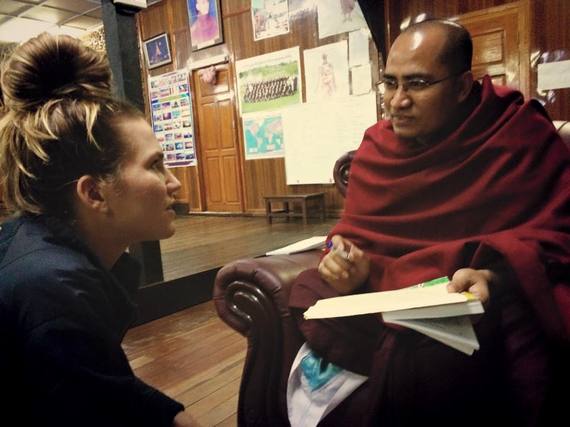How I Quit Smoking, Stopped Vaping and Learned to Eliminate Stress... One Breath at a Time | Talia Eisenberg

When I quit smoking with a rudimentary electronic cigarette in 2010, I was so passionate about this viable alternative to combustible tobacco that at the age of 25 I started a vaping company to help others. Slowly I realized that smoking, which became vaping, had caused me to focus on my breath. Inhale, exhale, repeat. This awareness of the breath connected me to something that impacted me far more than the nicotine. And through this epiphany I discovered meditation and how it can help millions of people.
Life is f*cking stressful. We're taking care of our own life stuff, and we try to help our friends, families and partners... and keep our careers on track, manage finances, and get ever healthier both physically or mentally and spiritually -- its a lot. All these and more are competing for our attention.
And it's causing us to lose our minds. Chronic stress is linked to insomnia, headaches, back pain, depression, and a lot worse. Different people deal in different ways. Some strategies are healthy, some not so healthy, others are obviously harmful. And the last type brings a whole new set of problems for everyone. Reducing the symptoms and sources of chronic stress is serious harm reduction, something I know a bit about.
I spent my early 20s in New York City. I went out heavily, partied, had fun, and like many young people took up cigarettes. I found that smoking helped quiet my racing mind, mask my insecurities, and reduce my stress. But after a couple years, and plenty of good times, I found my lifestyle no longer satisfying or even that fun. I needed to make a change.
So I left New York and went to Colorado to get sober. Nature knows what we need and the beauty of the outdoors did wonders. I began hiking, practicing yoga, and focusing on what was beginning to matter most in my life. I was able to give up alcohol and every other drug, all except for one: cigarettes. It's a gnarly addiction, and it was my last to kick.
Around this time, I was introduced to one of the first e-cigarettes on the market. I took it up in place of smoking. Vaping helped me quit, and I felt so much healthier even as I relied on it to relieve stress. I was determined to get more e-cigarettes for anyone else who wanted to really quit smoking.
I decided to launch a business to bring this safer nicotine option to the world. I wanted to defeat Big Tobacco by creating an exciting brand and making harm reduction relevant and way more stylish than smoking. A lot of people thought Henley's "Fuck Big Tobacco" campaign was cool and a smart way to draw attention to an industry focused purely on profit at the cost of millions of lives. Customers shared their stories about vaping to overcome addiction to cigarettes. Over four years, Henley grew into a multimillion dollar business and continues to help a lot of people.
But despite the clear benefits of vaping vs. smoking cigarettes -- and my personal beliefs and investment -- over the past year I have entirely stopped vaping and using e-cigarettes. I found a new way to clear my head, relieve stress, and even find inner peace, all without the aid of substances: mindfulness practice and meditation. Only later did I find that I was also getting much better rest, lowering my blood pressure, increasing my mental capacity, deeply relaxing and increasing parts of my brain that are vital to creativity, human connection, and being well.
My meditation practice -- sitting still and focusing on my breath for 45 minutes a day -- has reduced my stress, strengthened my ability to focus, and reprogramed certain negative thought patterns. I jumped into meditation with the same enthusiasm that I jumped into partying and then into vaping with. It has made me a much happier person.


I committed to learning as much as I can about this powerful ancient technology and all the people who have been applying it in their lives. In the last year alone my journey has introduced me to Theravada masters in Myanmar, monks studying ancient text in Pali, and enlightening people in the U.S. on week-long silent Vipassana retreats.
I'm studying the science behind meditation. Many studies show that it can help decrease stress, depression, anxiety, pain, and insomnia, and increases quality of life. A recent report by Dr. Sara Lazar, a Harvard neuroscientist, shows that "long-term meditators have an increased amount of gray matter in the insula and sensory regions, the auditory and sensory cortex," which means that meditation actually changes the brain and improves key functions that typically decline as we get older.
"Suddenly, meditation became performance enhancement, as well as part of the journey of discovery," says Arianna Huffington, and more and more high-powered people are learning to meditate, from Oprah to Kobe Bryant and CEOs of Fortune 500 companies. I read that Steve Jobs, the legendary co-founder of Apple, practiced meditation. He said, "If you just sit and observe, you will see how restless your mind is. If you try to calm it, it only makes things worse, but over time it does calm, and when it does, there's room to hear more subtle things -- that's when your intuition starts to blossom and you start to see things more clearly and be in the present more."
This made me wonder. What would meditation programs and tools look like if they had been made popular and accessible by the genius that brought the world the iPhone?
While meditation is becoming stylish and trendy, it remains largely inaccessible for many people. Nearly half the adults in the U.S. report that their stress levels are going up, and 70 percent say they do not know what to do about it. To me that is unacceptable.
It is time to bring meditation to the masses. I want places to practice mindfulness to become as accessible as strip malls and for happiness to become as familiar as Happy Meals. Meditation should not just be for Steve Jobs but also for everyday people with regular jobs. People need to know that they can skip that jolt from Starbucks and instead recharge their minds and bodies through the simple act of focusing on breathing in and out.
In my life's journey I have tried many strategies to cope with stress and to feel better. I am so grateful to have found meditation, a tool that is not only healthy but a source of inner peace and personal growth. I am committed to helping other people discover and practice the power of sitting still.
Talia Eisenberg is co-founder of Henley Premium Vapor and The Henley Vaporium in New York City. She meditates daily and is a co-founder of Re:Mind, a platform of solutions aimed to introduce and popularize effective meditation practices for millions of people who need them.
http://www.huffingtonpost.com/talia-eisenberg/how-i-quit-smoking-stoppe_b_7641758.html